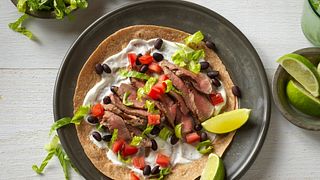New Study Finds Adding Lean, Unprocessed Beef to a Healthy Diet, as Defined by Dietary Guidelines, Does Not Adversely Affect Heart Disease and Diabetes Risk
june 11, 2020

Bloomington, Ind. and Chicago, Ill. — Results from a new study show that risk factors for cardiovascular disease and diabetes were similar when participants consumed a healthy US-style eating pattern with and without an additional 5.3 ounces of lean beef. The added beef replaced carbohydrates, primarily refined starches. All participants were considered at risk for type 2 diabetes and followed a healthy diet as outlined by the 2015 U.S. Dietary Guidelines for Americans, and separately a similar diet modified to have a larger portion of calories from lean beef in random order.
“Most indicators of metabolic and cardiovascular health, such as insulin sensitivity and LDL cholesterol, did not differ between the two diets. The only significant difference observed was a shift toward a greater percentage of cholesterol carried in larger, more buoyant LDL particles during the higher beef condition. This difference is potentially important because larger, more buoyant LDL particles may be less likely to promote atherosclerosis,” said Kevin C. Maki, Ph.D., who was the Study Director and is Adjunct Professor in Applied Health Science at the Indiana University School of Public Health - Bloomington.
“This study is important because it shows that red meat can be part of a healthy eating pattern,” said Dr. Maki, “Our study compared US-style healthy eating patterns with red meat intake that was below-average for the United States (about 1.2 ounces per day), versus a similar diet that contained an additional 5.3 ounces per day of unprocessed, lean beef. All foods consumed by the subjects during each diet period were provided by the research team.” The 33 study participants (26 women and 7 men) completed the crossover, controlled-feeding trial, where each subject was randomly assigned to follow one eating pattern for 4 weeks, followed by a washout of 2 weeks, then consumption of other diet for 4 weeks.
Beef is a nutrient-dense food with high quality protein, iron and zinc, but results from some observational studies have suggested that red meat consumption is associated with increased type 2 diabetes and cardiovascular disease incidence. “Our study showed that increasing intake of lean beef, as a replacement for refined starches in a healthy diet, did not worsen cardiometabolic risk factors. While this research is important for those who choose to include red meat in healthy diets, we are not encouraging people to increase red meat consumption or advocate that those who would otherwise consume a vegetarian-style eating pattern to begin eating red meat.”
The results are published online at the Journal of Nutrition. The study was funded by the Beef Checkoff and was completed by Dr. Maki and his team at Midwest Biomedical Research.
The Journal of Nutrition is published by the American Society for Nutrition.
Note to Journalists: Journalists interested in a copy of the Journal of Nutrition article may use this link to the open access article.
ABSTRACT
Substituting lean beef for carbohydrate in a healthy dietary pattern does not adversely affect the cardiometabolic risk factor profile in men and women at risk for type 2 diabetes
Kevin C. Maki, Meredith L. Wilcox, Mary R. Dicklin, Mary Buggia, Orsolya M. Palacios, Cathleen E. Maki and Melvyn Kramer
Background: Observational evidence suggests red meat intake is associated with type 2 diabetes mellitus (T2D) and cardiovascular disease incidence, but few randomized, controlled trials have assessed effects of lean, unprocessed red meat intake on insulin sensitivity and other cardiometabolic risk factors.
Objective: This study compared the United States Department of Agriculture (USDA) Healthy-U.S.-Style Eating Pattern, low in saturated fat and red meat (<40 g/d red meat; USDA-CON), to a modified version with an additional 150 g/d lean beef as an isocaloric replacement for carbohydrate (USDA-LB), on insulin sensitivity and cardiometabolic risk markers.
Methods: Participants (7 men, 26 women; 44.4 y old) with overweight/obesity (body mass index = 31.3 kg/m2) and prediabetes and/or metabolic syndrome completed this randomized, crossover, controlled-feeding trial consisting of two 28-d treatments (USDA-CON and USDA-LB) separated by a ≥14 day washout. Insulin sensitivity (primary outcome variable), lipoprotein lipids, apolipoproteins (apo) A1 and B, and high-sensitivity C-reactive protein (hs-CRP) (secondary outcome variables), in plasma or serum, and blood pressures were assessed at baseline and the end of each diet period.
Results: USDA-LB and USDA-CON did not differ significantly in effects on whole-body insulin sensitivity and other indicators of carbohydrate metabolism, lipoprotein lipids, apo A1 and B, hs-CRP, and blood pressures. USDA-LB produced a shift toward less cholesterol carried by smaller low-density lipoprotein (LDL) subfractions compared with USDA-CON (least squares geometric mean ratios for LDL1+2-C of 1.20 [p = 0.016] and LDL3+4-C of 0.89 [p = 0.044]), and increased peak LDL time vs. USDA-CON (1.01; p = 0.008).
Conclusions: Substituting lean, unprocessed beef for carbohydrate in a Healthy U.S.-Style Eating Pattern resulted in a shift toward larger, more buoyant LDL subfractions, but otherwise had no significant effects on the cardiometabolic risk factor profile in adult men and women with prediabetes and/or metabolic syndrome.






